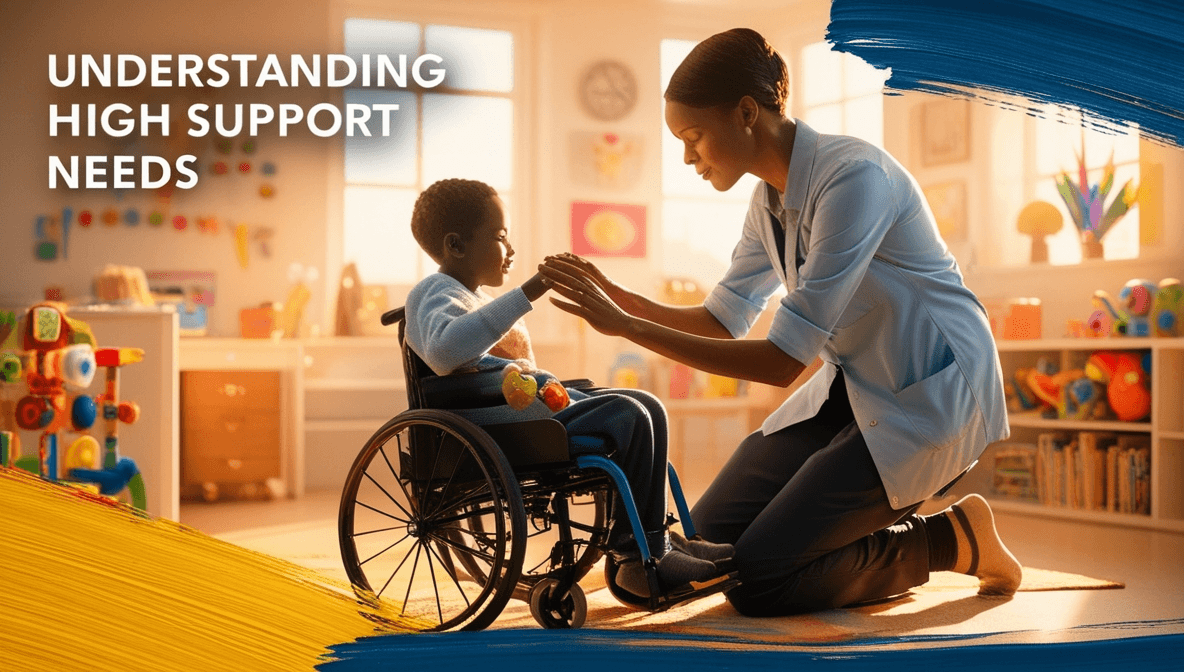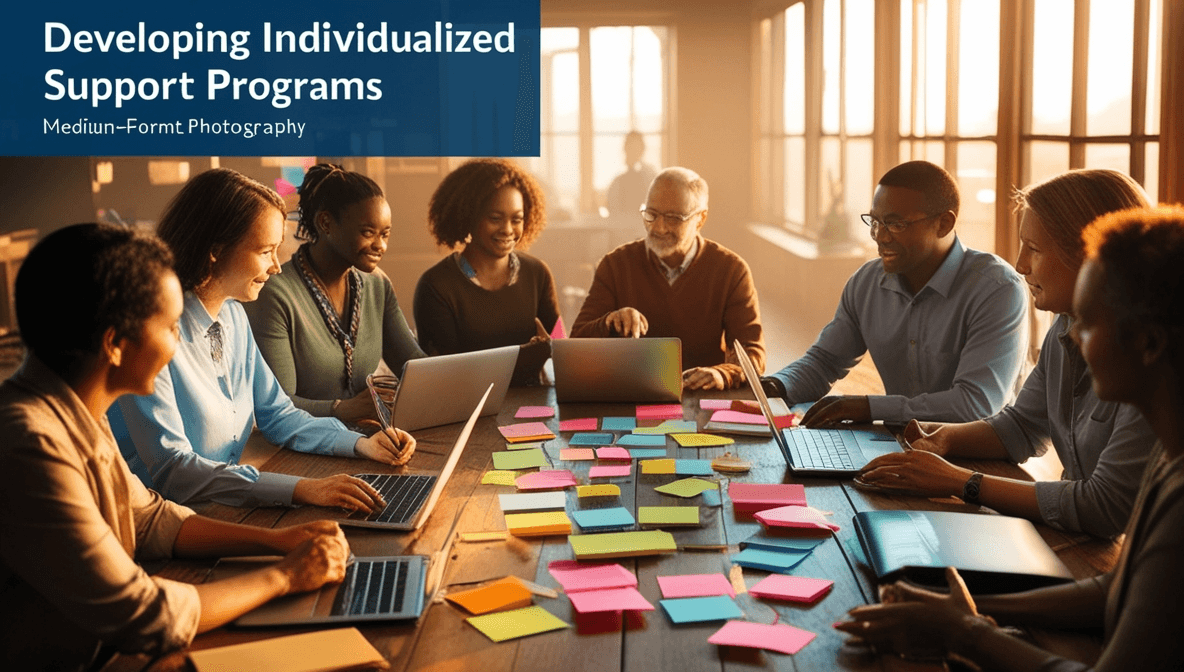Support strategies for individuals with high support needs, including disabled children, are vital for their well-being and success. While some individuals with health impairments may require extensive assistance in daily tasks, others with autism might need more specialized care.
Understanding the diverse range of support needed by individuals with high support requirements is key to providing effective assistance tailored to their unique circumstances. These individuals can lead fulfilling lives and achieve their goals despite significant challenges by implementing personalized and comprehensive support strategies.
Key Takeaways
- Identify individuals with high support needs, including those with intellectual disabilities: Recognize the unique requirements of individuals requiring extensive support, such as impairments.
- Develop personalized support programs: Tailor assistance plans to meet each individual’s specific needs and abilities.
- Implement customized teaching methods: Utilize teaching strategies that cater to the learning styles of individuals with high support needs.
- Provide necessary equipment and access: Ensure individuals access specialized tools and resources for their development.
- Monitor and evaluate support effectiveness: Regularly assess the impact of support programs to make informed adjustments.
- Strive for continuous improvement: Emphasize ongoing evaluation and enhancement of support strategies to optimize outcomes.
Understanding High Support Needs

Define Needs
Individuals with high support needs due to disabilities, including intellectual disability, require substantial assistance in various aspects of daily living. These needs encompass personal care, communication, mobility, and social interaction.
Support strategies aim to address the fundamental requirements of individuals with high support needs, ensuring their well-being and quality of life.
Challenges Faced
Individuals with high support needs face challenges, including limited independence, communication barriers, and difficulties accessing services. These hurdles can lead to feelings of isolation and frustration.
Moreover, individuals with high support needs may encounter obstacles to fully participating in social activities, education, and employment opportunities.
Importance of Recognition
Recognizing and addressing high support needs is crucial for promoting inclusivity and equality. By understanding these needs, society can create a more accessible environment for individuals with disabilities.
Effective support strategies enhance the quality of life for individuals with high support needs and empower them to lead fulfilling and independent lives.
Identifying Individuals with High Support Needs

Criteria & Indicators
Professionals identify individuals with high support needs based on various criteria and indicators. These include diagnosed intellectual disabilities, health impairments, psychiatric disabilities, and autism spectrum disorders. Challenges in daily living activities, communication difficulties, and behavioral issues are key indicators.
Early Detection is important.
Early detection of high support needs is crucial for timely intervention and support. It allows for tailored educational plans, therapies, and interventions to enhance the individual’s quality of life. By recognizing these needs early, professionals can provide appropriate resources and assistance to improve outcomes.
Role of Professionals
Professionals play a vital role in accurately identifying individuals with high support needs. Special education teachers, psychologists, speech therapists, and occupational therapists collaborate to conduct assessments and evaluations. Through comprehensive testing, observations, and interviews, these professionals determine the level of support required for each individual.
Pros & Cons
- Pros:
- Early detection leads to timely interventions.
- Tailored support enhances individual outcomes.
- Cons:
- Limited resources may hinder accurate identification.
- Challenges in accessing specialized professionals can delay the process.
Developing Individualized Support Programs

Collaboration Approach
Educators, families, and specialists collaborate to develop individualized support programs for students with unique learning needs. This collaboration ensures a holistic approach to addressing the diverse requirements of each student.
Collaboration among stakeholders allows for a comprehensive assessment of the student’s strengths and challenges. By pooling their expertise, educators, families, and specialists can create tailored interventions that cater to the student’s specific needs.
Regular Monitoring and Adjustment
Support programs for individuals with high support needs require regular monitoring and adjustment. Continuous progress tracking is essential to ensure that interventions are effective and beneficial.
Regular reviews of the support program help identify areas for improvement or modification. Educators should analyze data from assessments and observations to make informed decisions about adjusting strategies based on the student’s progress.
Individualized Education Plans (IEPs)
Individualized Education Plans (IEPs) are crucial in developing support programs for students with specific learning disabilities and special needs. These plans outline the student’s goals, accommodations, and instructional strategies tailored to their unique needs.
IEPs involve setting clear, measurable objectives that guide the implementation of interventions. They serve as a roadmap for educators, families, and specialists to ensure consistency in supporting the student’s learning and development.
Data-Driven Decision Making
Data-driven decision-making is fundamental in creating effective support programs for individuals with high support needs. Educators can identify trends and patterns that inform instructional practices by analyzing data from assessments, progress reports, and feedback.
Data helps individualize instruction, allowing educators to tailor teaching methods to suit each student’s learning style. This personalized approach enhances the effectiveness of interventions and promotes positive outcomes for students with learning disabilities.
Implementing Tailored Teaching Strategies

Special Education Interventions
Special education interventions are crucial in supporting individuals with high support needs. These interventions involve personalized approaches to address learning challenges and promote academic growth.
Individuals with high support needs benefit significantly from specialized instruction that caters to their unique learning styles and abilities. Educators can enhance student engagement and comprehension by tailoring teaching methods to suit individual needs.
Alternative Instructional Methods
Implementing alternative instructional methods allows educators to adapt teaching strategies effectively to accommodate diverse learning styles. These methods may include hands-on activities, visual aids, and interactive technology tools.
By incorporating special needs teachers trained in alternative instructional methods, schools can create inclusive learning environments that promote student learning and development. These teachers are vital in providing targeted support to students with varying learning abilities, including those with special needs.
Assessment Techniques
Utilizing alternative assessment techniques is essential for accurately evaluating the progress of individuals with high support needs. These techniques may involve performance-based assessments, portfolios, and peer evaluations.
Teacher preparation programs should emphasize training educators in various assessment techniques to evaluate student learning outcomes comprehensively. This approach enables teachers to gain valuable insights into students’ strengths and areas for improvement.
Adapting Teaching Strategies
Adapting teaching strategies to accommodate different learning styles is key to fostering a supportive educational environment for individuals with high support needs. Educators can tailor lesson plans to incorporate various modalities, such as auditory, visual, and kinesthetic learning.
Inclusive classrooms that cater to diverse learning experiences provide opportunities for students with high support needs to develop essential skills, including academic knowledge and social skills. By creating a supportive classroom environment, educators can nurture the holistic growth of all students.
Providing Special Equipment and Access
Special Accommodations
Individuals with special needs benefit greatly from special accommodations that cater to their unique requirements. These accommodations can range from adaptive tools to modified learning materials, ensuring inclusivity and accessibility.
Adapting environments and providing specialized tools can significantly improve the quality of life for individuals with disabilities. These individuals can engage more effectively in various activities by offering tailored solutions, such as braille materials for those with visual impairments.
Assistive Technology
Assistive technology is pivotal in empowering individuals with high support needs by promoting independence and active participation. From communication devices to mobility aids, these technologies bridge the gap between limitations and possibilities.
Implementing assistive technology not only enhances access to information but also fosters greater autonomy in daily tasks. For instance, voice recognition software enables individuals with speech impairments to communicate efficiently, thus boosting their confidence and social interactions.
Monitoring Support Program Effectiveness
Data Collection
Collecting data is essential to monitor and evaluate the effectiveness of support programs. Data can include progress reports, individual feedback, and support staff observations.
Regularly collecting data enables organizations to assess program impact, identify areas for improvement, and make informed decisions to enhance support services.
Feedback Analysis
Analyzing feedback from multiple sources provides a comprehensive view of program effectiveness. Feedback can come from individuals receiving support, their families, and support staff.
By analyzing feedback, organizations can gain insights into service quality, areas needing attention, and overall satisfaction levels.
Ongoing Assessments
Conducting regular assessments is crucial for tracking progress and ensuring that individuals with high support needs are receiving adequate care and assistance.
Ongoing assessments allow for timely interventions, adjustments to support plans, and the identification of evolving needs to provide tailored support.
Evaluating and Enhancing Support Strategies
Criteria
Support strategies for individuals with high support needs can be evaluated based on the individual’s progress in achieving set goals. Consistency in implementing strategies is crucial for assessing effectiveness.
Feedback from individuals, families, and support staff provides valuable insights into strategies’ impact. Key evaluation criteria include observing reactions and measuring outcomes.
Continuous Improvement
Continuous improvement involves adapting strategies to better suit individual needs. Regular assessments ensure that support remains relevant and effective.
Support strategies can evolve to address changing needs by incorporating new activities or visuals. This flexibility in approach allows for personalized support.
Feedback and Reflection
Feedback from all involved parties helps identify areas for improvement. Reflecting on past experiences enables the development of more tailored strategies.
Analyzing social stories and actions taken in various situations can lead to more effective support plans. Utilizing site maps can enhance understanding and guide actions.
Ensuring Continuous Improvement
Ongoing Training
Ongoing training is crucial in ensuring continuous improvement for individuals with high support needs. Regular training sessions help professionals stay updated on the latest techniques and strategies. By enhancing their skills, professionals can better support individuals with various impairments.
Professional development opportunities enable staff to learn new approaches tailored to each student’s unique needs. Professionals can gain valuable insights into effective support strategies through workshops and seminars. This ongoing learning process fosters a culture of growth and adaptability within support teams.
Staying Informed
Staying informed about best practices and the latest research is essential for supporting individuals with high support needs. Professionals must regularly review and update their knowledge base to provide the best care. By staying abreast of current trends, professionals can implement evidence-based interventions that yield positive outcomes.
Continuous improvement also involves collaborating with other professionals and sharing knowledge within the community. Professionals can exchange ideas and learn from each other’s experiences by participating in conferences, webinars, and networking events. This collaborative approach enhances support services and promotes a holistic understanding of diverse impairments.






Leave a Reply